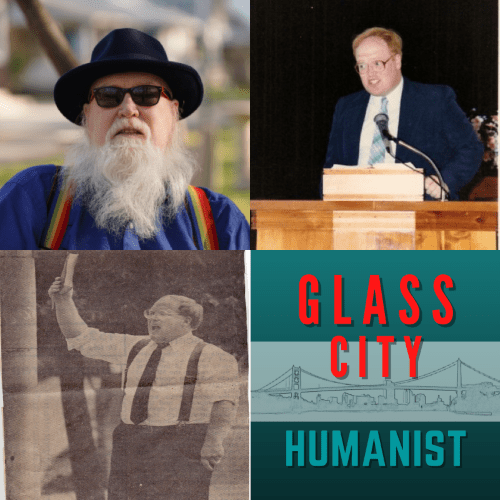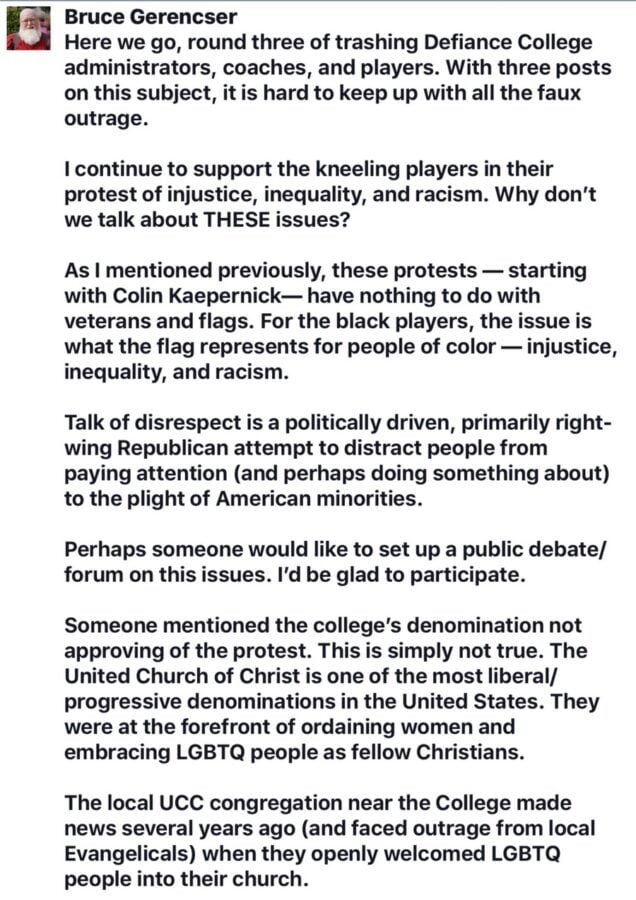
After I wrote Part One, Joe took to commenting on several posts on this site. You can check out his comments here, here, here, here, and here. All told, Joe left twenty-five comments before I cut him off.
I gave Joe one last opportunity to say whatever he wanted to say. After that, move on. I told him that I would approve no further comments from him. Joe tried to continue commenting, but I deleted his comments.
I stated in the comment section:
As sure as the sun comes up in the morning, give Evangelicals enough rope and they will reveal their true beliefs and character. I’ve seen it over and over and over again. Joe Sperling is the latest example of this.
As time went on and he got pushback from readers, his pronouncements became more aggressive. This is one of the reasons I typically only give Evangelicals one opportunity to comment. Joe wasn’t Revival Fires — a fucking low bar if there ever was one — so I extended to him commenting privileges. And sure as the sun comes up in the morning . . . 😂
I finally asked him to make one last comment and move on. Do you think he could do that?
Tonight, he sent me two emails. Here’s what he said:
“I’m not whining. All you had to is ask. However from now on when someone mentions Bruce G. I’ll think of a little kid sticking his fingers in his ears and running to another room to avoid hearing things he doesn’t like. lol. See ya later.“
“I’m sending from here in case the other didn’t go through. I’m not whining Bruce. All you had to do was ask. I’ll always remember you though as a little kid shoving his fingers into his ears and running away because he is hearing things he doesn’t like. lol. You are too much ha ha.”
Evidently, he thought I needed to hear this twice. I know I’m a little slow these days 😂😂
Well, you can probably figure out how I responded:
Go fuck yourself, Joe. You said your piece. I have no interest in talking with you further.
Let’s see if you can respect boundaries.
I quickly learned that Joe is a bully, someone who has no regard for personal boundaries.
What follows is a transcript of the emails he sent me and my responses:
Joe: Seriously— what makes you believe you can say something like that to someone and it’s totally OK? Is this how you normally address people you disagree with? I’m actually flabbergasted [sic]. Unbelievable.
I guess you’ll use this now with your laughing emojis. That’s cool. Be my guest. See ya.”
Bruce: No, I’ll just tell you again, Joe, fuck off 🍆🍆🍆🍆. Second request, don’t contact me again.
Joe: “Go f&$&#k yourself Joe? Really? For quoting 1John 2:19? And then you put up your own article where you allow someone to quote it once again? OK— carry on. I feel no need to curse you back. God bless you.”
Bruce: Once again, Joe, fuck off. Third request, please do not contact me.
Joe: “Can I have your permission to quote you? I’m writing a chapter for a book on abnormal psychology and your statement would fit in well. They ask to get approval first though. I probably wouldn’t include the four purple thingies, but your statement would work great as a segue into the next chapter. Let me know. And thanks!”
Bruce: “No, I’ll just tell you again, Joe, fuck off 🍆🍆🍆🍆. Fourth request, don’t contact me again.
You are officially being a passive-aggressive bully.
Thank you for proving exactly the kind of man you really are; someone who has no regard for boundaries; someone who thinks he can control how people respond to him.”
Today, I woke up to two more emails from Joe. I did not respond to them.
Joe: Bruce— you are too much. You tell me to f@#@#k off and then say it’s ME who is showing who they really are? You are the control freak not me. Whose “boundaries”? You are the one with the Blog. I won’t contact you again. But seriously Bruce, get some psychological help. If you think it is your “right” to tell people to f$#&$k off you have some SERIOUS mental problems.
Joe: I forgot to add one thing: you are shooting yourself in the foot Bruce. Anyone can clearly see YOU are being the bully not me. I will send no further emails. It’s hard NOT to respond when someone tells you to f#$&$k off. It’s called being human.
As you can see, Joe is a Jesus-loving, Bible-believing (but, not practicing) passive-aggressive bully. As Sage, a long-time reader and my friend (she encourages me to take up pole dancing as Santa, the Stripper) :), observed, Joe is skilled at gaslighting:
You are quite skilled at gaslighting. Someone takes offense to your analogy, and point out how it fails, then you respond by claiming they are the problem and they need fix their views. That is classic gaslighting – when someone questions you, attack them and try to belittle them. You even carry it over to a different post, praising one poster while belittling the other. Now Michael,is the “good” deconvert and Sage is the “Bad” deconvert.
I clearly understood the point you were making. I even gave you ways to make the same point without using slavery. But it appears you are so determined to defend yourself and your analogy that you justify any type method to dismiss Sage. I have called you out as judgemental. I haven’t attacked you personally, I’ve attacked your analogy. You respond by attacking me personally, belittling me, gaslighting me, dismissing me and hope that doing so will destroy my point, or leave me unable to argue with you
I made a good faith effort to respond to and interact with Joe. He “seemed” like a decent Christian. However, after fifteen years of responding to countless Joes, I know that decent, thoughtful Evangelicals are few and far in between. Such people are typically “nice” until they are challenged or someone says something they don’t like. Then they reveal their true character. Such was the case with Joe. His comments became more hostile, more personal. I tried, as did others, to correct his factual errors, to no avail. Joe knows what he knows, end of discussion. Joe began his interaction with me saying that I never was a Christian and I was headed for Hell, and his interaction with me ended the same way.
Joe’s upset that I told him to “go fuck himself.” Tough shit. No one is going to control what I say or the language I use. I rarely tell people to “fuck off,” but in Joe’s case, it was warranted. Occasionally, a reader will object to me using curse words. Evangelicals, in particular, seem to have their freaking 🙂 sensibilities offended when someone tells them to go fornicate with themselves. I suspect there are times that I deliberately tell Evangelicals to “fuck off” because I know doing so riles them up. I do the same with some of my letters to the editor of the local newspaper. I call it “poking the bear.” Poked Evangelicals will quickly show that they are not Holy Spirit-controlled or following in the steps of Jesus. In Joe’s case, I was genuinely angered by his personal attacks on me, his refusal to accept my story at face value, and his unwillingness to admit that he was wrong. I corrected him three times, using facts and evidence easily found on the Internet, but Joe just doubled down and refused to admit he had erred.
I’ve dealt with scores of Joes over the years. In that time, I have taken various approaches to the Joes of the world: full engagement, limited engagement, or I just ignore them. I respond to every email I receive — thousands of them over the past fifteen years. In Joe’s case, I answered numerous emails from him before saying “enough.” I was thoughtful, honest, and open until he became aggressive and started making things personal. It was then, and only then, that I told him to “go fuck himself.” Joe asking to quote me in a book (a story I don’t believe is true) was nothing more than a threat of exposure. I am a public figure, so Joe is free to write or say anything he wants about me. I am quoted in several books written by Evangelicals. None of them asked me for permission to quote me (nor did they let me know they had done so). I am a big believer in personal responsibility, so I own my words; all of them, including telling someone to “fuck off.” Have I ever said things I shouldn’t have? Yep, and in every instance, I have owned my words, apologized, and, if warranted, changed what I had written. But, apologizing for telling a passive-aggressive bully and gaslighter to “fuck off”? Not a chance . . .
Joe’s ultimate attack came when he suggested I have mental health problems. Why? Because I told him to “go fuck himself.” 🙂 🙂 🙂 Joe doesn’t care about my mental health. If he did, he would have behaved differently. Regular readers know, of course, that I have been seeing a secular psychologist for a decade. Not one time have I been told that I needed to clean up my gosh darn 🙂 language. (Please see Evangelical Swear Words.) I just talked to my therapist today. We talked about real stuff; you know: gastroparesis, fibromyalgia, osteoarthritis, chronic pain, trauma, and how my Independent Fundamentalist Baptist (IFB) upbringing caused untold trauma and harm, to me, my wife, and my grown children. You know, REAL issues.
I am sure Joe won’t like what I have written here. I’m sure he will send me at least one email to register his outrage. If he does, I will post his email below.
Thank you for reading. I appreciate your love and support.

Bruce Gerencser, 66, lives in rural Northwest Ohio with his wife of 45 years. He and his wife have six grown children and thirteen grandchildren. Bruce pastored Evangelical churches for twenty-five years in Ohio, Texas, and Michigan. Bruce left the ministry in 2005, and in 2008 he left Christianity. Bruce is now a humanist and an atheist.
Connect with me on social media:
Your comments are welcome and appreciated. All first-time comments are moderated. Please read the commenting rules before commenting.
You can email Bruce via the Contact Form.











